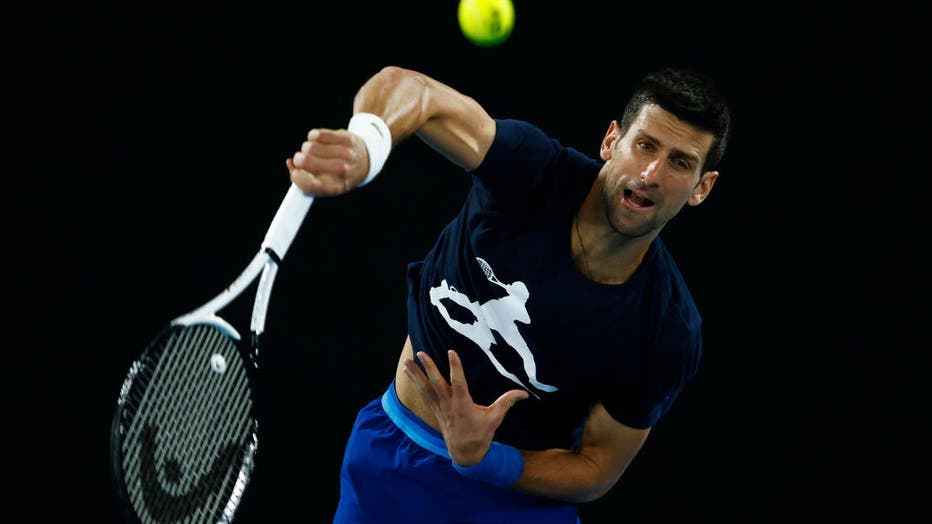Novak Djokovic: Visa revoked for 2nd time in Australia, faces deportation
MELBOURNE, Australia - Novak Djokovic faces deportation again after the Australian government revoked his visa for a second time, the latest twist in the ongoing saga over whether the No. 1-ranked tennis player will be allowed to compete in the Australian Open despite being unvaccinated for COVID-19.
Immigration Minister Alex Hawke said Friday he used his ministerial discretion to cancel the 34-year-old Serb’s visa on public interest grounds — just three days before play begins at the Australian Open, where Djokovic has won a record nine of his 20 Grand Slam titles.
Djokovic’s lawyers were expected to appeal at the Federal Circuit and Family Court, which they already successfully did last week on procedural grounds after his visa was first canceled when he landed at a Melbourne airport.
Deportation from Australia usually leads to a three-year ban on returning to the country. That would make Djokovic 37 the next time he would be allowed to compete at the Australian Open.
Hawke said he canceled the visa on "health and good order grounds, on the basis that it was in the public interest to do so." His statement added that Prime Minister Scott Morrison’s government "is firmly committed to protecting Australia’s borders, particularly in relation to the COVID-19 pandemic."
Morrison and Hawke are part of a conservative government which prides itself on being tough on border control.
Morrison welcomed Djokovic’s pending deportation, saying Australia had achieved one of the lowest pandemic death rates, strongest economies and highest vaccination rates in the world.
"This pandemic has been incredibly difficult for every Australian but we have stuck together and saved lives and livelihoods. ... Australians have made many sacrifices during this pandemic, and they rightly expect the result of those sacrifices to be protected," Morrison said in a statement. "This is what the Minister is doing in taking this action today."
Everyone at the Australian Open — including players, their support teams and spectators — is required to be vaccinated for the illness caused by the coronavirus. Djokovic is not inoculated and had sought a medical exemption on the grounds that he had COVID-19 in December.
That exemption was approved by the Victoria state government and Tennis Australia, apparently allowing him to obtain a visa to travel. But the Australian Border Force rejected the exemption and canceled his visa when he landed in Melbourne on Jan. 5.
Djokovic spent four nights in an immigration detention hotel before a judge on Monday overturned that decision. That ruling allowed Djokovic to move freely around Australia and he has been practicing at Melbourne Park daily to prepare to play in a tournament he has won each of the past three years.
Djokovic has held practice sessions every day since he was released from detention, posting a photo on social media late Monday of himself with his team on Rod Laver Arena.
He had a scheduled mid-afternoon practice booked for Friday on the tournament’s main show court, but switched his times to start and finish early.
Media started gathering at the vehicular entry to the building where Djokovic was reported to be meeting with his lawyers after the minister’s decision was handed down.

Novak Djokovic of Serbia serves during a practice session ahead of the 2022 Australian Open at Melbourne Park on Jan. 14, 2022, in Melbourne, Australia. (Photo by Daniel Pockett/Getty Images)
With his legal situation still in limbo, Djokovic was placed in the tournament bracket in Thursday's draw, slated to face Miomir Kecmanovic in an all-Serbian matchup in the first round.
Melbourne-based immigration lawyer Kian Bone said Djokovic’s lawyers face an "extremely difficult" task to get court orders over the weekend to allow their client to play next week.
Speaking hours before Hawke’s decision was announced, Bone said: "If you left it any later than he has done now, I think from a strategic standpoint, he’s really hamstringing Djokovic’s legal team, in terms of what sort of options or remedies he could obtain."
Djokovic’s lawyers would need to go before a duty judge of the Federal Circuit and Family Court, or a higher judge of the Federal Court, to get two urgent orders. One order would be an injunction preventing his deportation, such as what he won in court last week. The second would force Hawke to grant Djokovic a visa to play.
"That second order is almost not precedented," Bone said. "Very rarely do the courts order a member of the executive government to grant a visa."
Jacqui Lambie, an influential independent senator, argued that Djokovic should be sent packing if he had broken Australia’s vaccine rules. But hours before the visa cancellation was announced, she complained about how long Hawke was taking to reach a decision.
"Why does this keep dripping out of the tap? Alex Hawke, where are you? Missing in action?" Lambie asked.
"If you can’t make a decision on Novak Djokovic, goodness me, how are you guys running the country? This is an absolute shambles," she added.
___
McGuirk reported from Canberra, Australia.

